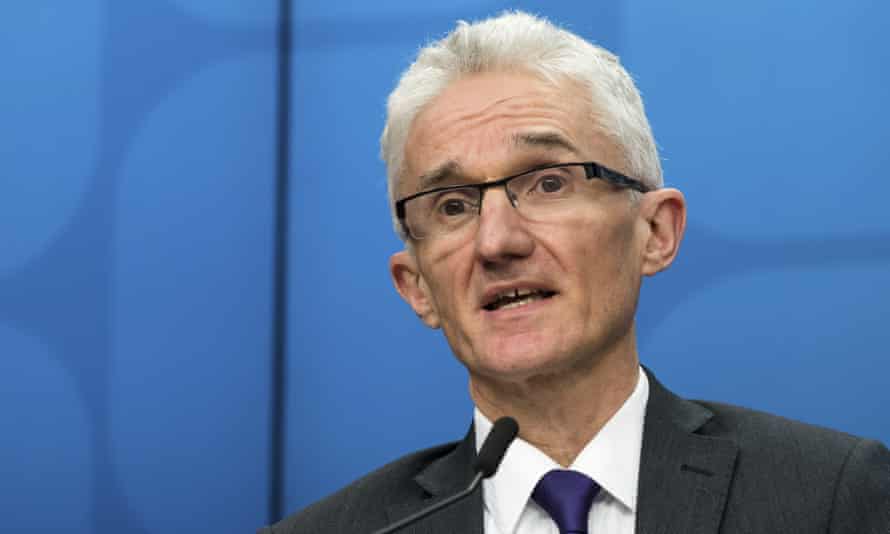Wealthier countries will be dealing with coronavirus in 2022 and beyond, says UN humanitarian agency chief.

Patrick Wintour Diplomatic editor
Poorer countries are unlikely to gain substantial access to Covid-19 vaccines until the latter half of next year, meaning wealthier European countries could still remain vulnerable to new waves of infection for years, the UN’s humanitarian chief has said.
“For poorer countries there will be small quantities of vaccine conceivably in the second quarter of next year, probably not much more than that for a while after that, and it’s 2022 and beyond when the major progress is made,” Mark Lowcock, the under-secretary-general of the UN’s humanitarian agency OCHA, said in an interview. “That is a best judgment, recognising large quantities depend on the number of vaccines authorised, the manufacturing and then the solution the world comes to on who accesses what when.”Advertisementhttps://8528391ecdd8df9f139fd660401c2b54.safeframe.googlesyndication.com/safeframe/1-0-38/html/container.html
Lowcock said that European countries would therefore be “dealing with” the coronavirus in 2022 and probably beyond, even if their economies bounced back in 2021.
“It is highly likely the places where the virus finds it is easier to survive longest will be fragile, conflict-affected states with weak institutions, but the virus can get everywhere,” he said. “It is going to be true that nowhere is safe until everyone is safe because it is a globalised world.
“If this simply becomes a race in which those who are most financially liquid and will pay the most [get first access], then the poorest countries will be at the end of the queue.”
Lowcock said it was understandable that countries that had financed the research and manufacture of vaccines would seek to gain first access, but warned that vaccine nationalism would prove to be counterproductive and self-defeating.
A UN-led vaccine commitment, known as Covax, has managed to secure 700m doses of vaccines to be distributed between the 92 lower-income countries that have signed up, but even so Lowcock said huge problems remained, including the possibility that the focus on a Covid vaccine would divert money and resources away from traditional immunisation programs that he said had the capacity to save more lives.
The former senior British civil servant explained: “You can already see in every developed country it is proving a huge logistical and institutional challenge to cover the population fast enough with the available staff and institutions. That is going to be an even bigger problem in countries which have very weak public health systems.
“Some of these countries are very reliant on NGOs, Unicef or World Health Organization to help implement their immunisation programs so there will be big challenges that go beyond the cold-chain challenges. Reaching inaccessible places, and having the staff to run these programs, that will be a huge challenge.”
He said it may be necessary to carve out special funds from within Covax to ensure that refugees and internally displaced people in humanitarian settings not necessarily covered by a country’s vaccination program received help. He said 1% of the world’s population – 60 million people – were now living in environments where they were not under the control or authority of a government, but instead under the sway of an opposition, extremist or criminal group.
He said that overall Covax was going to have an important mitigating impact, but “we are billions of dollars away from the finances needed to help the countries that would not otherwise be able to access a vaccine. There is a real worry that we are going to see cash transferred to Covax that leads to a shortfall in traditional immunisation programs.”
He said: “There has been a substantial erosion of routine immunisations this year with real consequences for killer diseases such diphtheria and measles from which children have largely been protected in recent years. This year either due to lockdowns or fiscal constraints 80 million children in the second and third quarters of children did not get their immunisation on time. That is a real problem now.”
As former permanent secretary of the UK’s department for international development, Lowcock also challenged the UK government to explain what it intended to cut by reducing the overall size of the British overseas aid programme to only 0.5% of the GDP in 2021, a cut that will slice as much as £5bn out of the £15bn aid programme.
“The UK overseas aid programme has always been well targeted on the world’s poorest countries, and life-saving activities,” he said. “This is going to be a very large cut and I find it hard to think that things that really matter a lot are not going to be affected … A relatively small saving for the UK budget is going to have really quite big implications for the world’s poorest people.”



